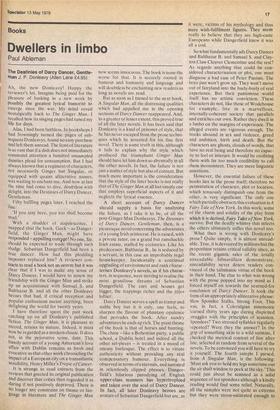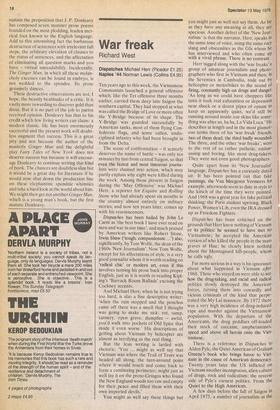Books
Dwellers in limbo
Paul Ablem an
The Destinies of Darcy Dancer, Gentleman J. P. Donleavy (Allen Lane £4.95) Ah, the new Donleavy! Happy the reviewer's lot. Imagine being paid for the pleasure of basking in a new work by Possibly the greatest lyrical humorist to emerge since the war. My mind roved nostalgically back to The Ginger Man. I recalled how its singing pages had tuned my life for days.
Alas, I had been faithless. In bookshops I had frowningly turned the pages of subsequent Donleavys, found no easy purchase and left them unread. The feast of literature is so vast that if a dish does not immediately command attention a hundred unsam pled dainties plead for consumption. But I had always known that a regiment of characters, not necessarily Ginger but Singular, or equipped with quaint alliterative names, was waiting to enchant me. And now at last the time had come to dive, doubtless with delight, into the Destinies of Darcy Dancer, Gentleman.
Fifty baffling pages. later, I reached the line:
`If you stay here, you too shall become Mad.'
With a shudder of acquiescence, I snapped shut the book. Geek — as Dangerfield, the Ginger Man, might have responded —appalling outrkgel No one, Sir. Should be expected to wade through such sludge. Sebastian Dangerfield had been a true dancer. How had this plodding imposter replaced him? A reviewer contracts to read a book not an oeuvre but it was clear that if I was to make any sense of Darcy Dancer, I would have to renew my friendship with the Ginger Man and strike Up an acquaintance with Samuel S. and Balthazar B. and all the other Donleavy heroes that had, if critical reception and Popular enthusiasm meant anything, been delighting the world for twenty years.
I have therefore spent the past week catching up on all Donleavy's published fiction. The Ginger Man, it is pleasant to record, retains its stature. Indeed, it must now be regarded as a modern classic. It does not, in the pejorative sense, date. This bawdy account of a young American's love affair with Dublin remains as fresh and evocative as that other work chronicling the impact of a European city on a transatlantic sensibility, Henry Miller's Tropic of Cancer.
It is strange to read extracts from the reviews that greeted its original publication and discover that critics then regarded it as daring if not positively depraved. There is no longer any constraint on theme or language in literature and The Ginger Man
now seems innocuous. The book is none the worse for that. It is securely rooted in humour and humanity and language and will doubtless be enchanting new readers as long as novels are read.
But as soon as I turned to the next book, A Singular Man, all the distressing qualities which had appalled me in the opening sections of Darcy Dancer reappeared. And, to a greater or lesser extent, this proved true of all the later novels. It has been said that Donleavy is a kind of prisoner of style, that he has never escaped from the prose techniques which he invented for his fine first novel. There is some truth in this, although it fails to explain why the style which produced the triumphant Ginger Man should have let him down so abysmally in all the other novels. In fact, the failure is not just a matter of style but also of content. But much more important is the consideration that the style of the later books is not really that of The Ginger Man at all but simply one that employs superficial aspects of it and neglects the lyrical essence.
A short account of Darcy Dancer should supply a basis for analysing the failure, as I take it to be, of all the post-Ginger Man Donleavys. The Destinies of Darcy Dancer, Gentleman, then, is a picaresque novel concerning the adventures of a young Irish aristocrat. He is raised, with a private tutor, on a grand but ramshackle Irish estate, staffed by eccentrics. Like his predecessor, Balthazar B., he is seduced by a servant, in this case an improbably regal housekeeper. Incidentally a continual upgrading of environment and rank characterises Donleavy's novels, as if his characters, in sequence, were striving to realise the most grandiose dreams of Sebastian Dangerfield. The cars and houses get bigger, the trappings richer and the titles loftier.
Darcy Dancer serves a spell as tramp and stable boy but it is only, one feels, to sharpen the flavour of phantasy opulence that pervades the book. After sundry adventures he ends up rich. The main theme of the book is that of horses and hunting. The chase —like a Bohemian party, a public school, a Dublin hotel and indeed all the other set-pieces — is treated in a mood of uneasy burlesque. The effect is to vitiate authenticity without providing any real compensatory humour. Everything is observed in terms of externals, and narrated in relentlessly clipped phrases. Dangerfield's hilarious parodying of English upper-class manners has hypertrophied and taken over the soul of Darcy Dancer. In fact, all later Donleavy heroes are avatars of Sebastian Dangerfield but are, as it were, victims of his mythology and thus mere wish-fulfilment figures. They seem really to believe that they are high-caste Europeans while Dangerfield knew it was all a cod.
So what fundamentally ails Darcy Dancer and Balthazar B. and Samuel S. and Clayton Claw Cleaver Clementine and the rest? As regards anything that could .be considered characterisation or plot, one must diagnose a bad case of Peter Panism. The boys just won't grow up. They won't move out of fairyland into the hurly-burly of real experience. But their pantomine world itself has no artistic conviction. These characters do not, like those of Wodehouse for example, live in a marvellous, internally-coherent society that parallels and enriches our own. Rather they dwell in a limbo on the margins of experience. The alleged events are vigorous enough. The books abound in sex and violence, greed and ambition, birth and death. But the characters are ghosts, clouds of words, that have no real being and therefore no capacity to feel or interact. It would be crediting them with far too much credibility to call .them inconsistent. They are mere linguistic assertions.
However, the essential failure of these books lies in the prose itself; therefore no permutation of character, plot or location, which tenuously distinguish one from the other, is very significant. The only one which partially obstructs this evaluation isA Fairy Tale of New York. In this work, some of the charm and solidity of the play from which it is derived, Fairy Tales of New York, survive. But the deadly whimsy that infects
the others ultimately stifles this novel too.
What then is wrong with Donleavy's
• prose? Quite simply, it is almost unreadable. True, it is devoured by millions but the proposition retains critical validity since, as the recent gigantic sales of the totally unreadable Silmarillion demonstrate, unreadability never deters readers convinced of the talismanic virtue of the book in their hand. The clue to what was wrong with the prose popped into my mind as I forced myself on towards the yearned-for conclusion of Darcy Dancer. It took the form of an appropriately alliterative phrase: Slow Spondee Stalks, Strong Foot. This was, in fact, a Coleridgian mnemonic learned thirty years ago during dispirited struggles with the principles of scansion. Spondees? Two stressed syllables regularly repeated? Were they the answer? In the grip of something akin to a wild surmise, I checked the metrical content of line after line, selected at random from several of the novels. To be convinced you will have to try it yourself. The fourth sample I parsed, from A Singular Man, is the following: 'Must ask you to hold my legs sometime out the air shaft window to peek at the sky.' This could just about be scanned as a solid sequence of ten spondees although a kindly reading would find some relief. Naturally, all the samples were not quite as extreme but they were stress-saturated enough to sustain the proposition that J. P. Donleavy has composed seven monster prose poems founded on the most plodding, leaden metrical foot known to the English language. Add to this astonishing fact the barbarous destruction of sentences with irrelevant full stops, the arbitrary elevation of clauses to the status of sentences, and the affectation of eliminating all question marks and you have — virtual unreadability. Incidentally, The Ginger Man, in which all these melancholy excesses can be found in embryo, is not wedded to the spondee. Its prose genuinely dances.
These destructive observations are not, I hope, the beastly beatitudes of a critic. It is vastly more rewarding to discover gold than dross. But it is no part of the job to parrot received opinion. Donleavy has that to his credit which few living writers can claim: a modern classic. He has been enormously successful and the present work will doubtless augment that success. This is a great pity and not because the author of the masterly Ginger Man and the delightful play Fairy Tales of New York does not deserve success but because it will encourage Donleavy to continue writing this kind of book. The chances are doubtless slim but it would be a great day for literature if he would now shut down the production line on these elephantine spondaic whimsies and take a hard look at the world about him. We might then get not another Ginger Man, which is a young man's book, but the first mature Donleavy.



































 Previous page
Previous page